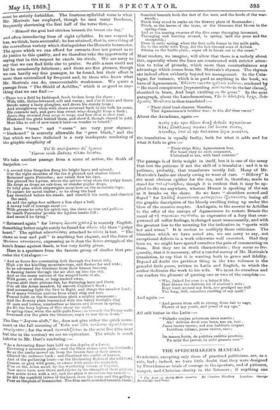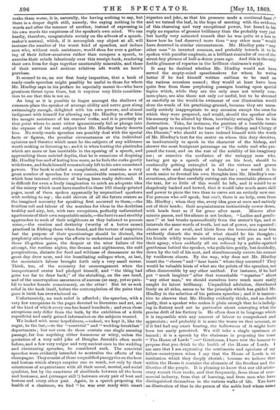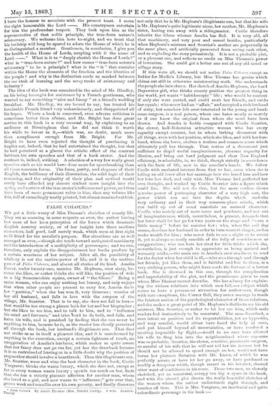THE SPEECHMAKER'S MANUAL.*
SPEECHES, excepting only those of practised politicians, are, as a rule, bad ; indeed, we have little doubt that they were designed by Providence as trials of courage in the speakers, and of patience, temper, and Christian charity in the listeners ; if anything can • The Book of Beady-Made Speechu. By Charles llindley. London: Clomp Boudedge and Som. make them worse, it is, naturally, the having nothing to say, but there is a deeper depth still, namely, the saying nothing in the words and after the manner of another, instead of expressing in his own words the emptiness of the speaker's own mind. We can hardly, therefore, congratulate society on the advent of a speechmaker's manual, which, if it accomplish any object at all, will increase the number of the worst kind of speeches, and induce men who, without such assistance, would shun for ever a gathering of their fellow-creatures rather than compose a speech, to exercise their minds laboriously over this receipt-book, rendering their own lives for days together unutterably miserable, and those of their nervous and anxious relatives not worth an hour's purchase.
It seemed to us, on our first hasty inspection, that a book of ready-made speeches might possibly be useful to those for whom Mr. Hindley says in his preface he especially meant it—who have greatness thrust upon them, but it requires very little consideration to see that this is not so.
As long as it is possible to linger amongst the shallows of common-place the speaker of average ability and nerve goes along swimmingly enough, delighted with his own powers, and almost indignant with himself for allowing any Mr. Hindley to offer him the meagre assistance of his orators' corks, and it is precisely at that point where he must either ignominiously fail or plunge into the expanse of his real subject that Mr. Hindley basely deserts him. No ready-made speeches can possibly deal with the special facts or figures, the peculiar circumstances or the individual opinions and theories which must be the subjects of any addresses worth making or listening to ; and it is when leaving the platitudes which are more or less inevitable in the opening of a speech, and approaching these untried depths, that he is conscious of despising Mr. Hindley less and of hating him more, as he feels the corks gently withdrawn, and finds himaelf remorselessly left to his own unassisted powers. The book is called a compilation, and contains a very great number of speeches for every conceivable occasion, most of which bear internal evidence of having been really delivered. It is difficult for even a lively imagination to catch an adequate idea of the misery which must have resulted in these 163 closely-printed pages, most of them spoken apparently by unpractised speakers with nothing to say ; the cold shivers of all the future orators as the imagined necessity for speaking first occurred to them,—the fruitless toil and labour of the searches for ideas in the doubtless healthy and airy, but, with rare exceptions, perfectly unfurnished apartments of their own respectable minds,—the furtive and stealthy approaches to such of their neighbours as they believed to possess some,—the caution and dexterity (worthy of a better cause) practised in filching them when found, and the torture of suspicion lest the purpose of their questionings should be divined, the perplexity attendant upon the efforts to understand and assimilate these ill-gotten gains, the despair at the utter failure of the attempt, the restless nights, the dreams and nightmares, the cold perspirations, distaste for food and wildness of demeanour as the great day drew near, and the humiliating collapse when, at last, the mountain's labour brought forth only a very small mouse. Think, too, of the necessity for encouragement when the inexperienced orator had pledged himself, and "the thing had gone too far to draw back;" of the shrinking, on the one hand, and of the unscrupulous assurances of success (so easy, yet so painful to tender female consciences), on the other ! But let us seek relief in the book itself, before the contemplation of the pains that gave it birth has overwhelmed us.
Unfortunately, no such relief is afforded ; the speeches, with a very few excepeions in the pages devoted to literature and art, are of the kind of which every one has heard hundreds ; and even these exceptions only differ from the bulk, by the exhibition of a little superficial and easily gained information on the subjects treated.
We looked with some hopefulness, —indeed, we kept it, like the sugar, to the last,—to the "convivial" and " wedding-breakfast " departments ; but not even do these contain one single amusing passage, far less anything either humorous or witty, unless the quotation of a very mild joke of Douglas Jerrold's often made before, and a few very vulgar and very ancient ones in the wedding and christening speeches, be considered such. The convivial speeches were evidently intended to neutralize the effects of the champagne. They consist of those unqualified panegyrics on the host and hostess which always surprise one so much, not only by their minuteness of acquaintance with all their moral, mental, and social qualities, but by the exactness of similitude between all the hosts and hostesses, and (stranger still !) between every pair of host and hostess and every other pair. Again, in a speech proposing the health of a chairman, we find "he was ever ready with smart
repartee and joke, so that his presence made a continual feast and we turned the leaf, in the hope of meeting with the evidene.e of this charming and very exceptional power, but found in his reply no repartee of greater brilliancy than the probably very just but hardly very animated remark that he was quite at a loss to know how he had deserved more than "any other man" would have deserved in similar circumstances. Mr. Hindley puts "any other man" in inverted commas, and probably intends it to be spoken with peculiar emphasis, as a brilliant reminder of one of the street-boy phrases of half-a-dozen years ago. And this is the only feeble glimmer of repartee in the brilliant chairman's reply.
It may be doubted whether Mr. Hindley would not have served the empty-mind speechmakers for whom he writes better if he had himself written outlines to be used on the various occasions named ; they would at least have been quite free from those perplexing passages bearing upon special topics which, while they are the only ones not utterly common-place, are also those not only not useful, but to be shunned as carefully as the would-be swimmer of our illustration would shun the weeds of his practising-ground, because they are necessarily entirely inappropriate to any occasion except the ones for which they were prepared, and would, should the speaker allow his memory to be allured by them, inevitably entangle him to his destruction. Take, for instance, the position of a humble curate called upon to respond to the toast of "The Bishop and Clergy of the Diocese," who should so have imbued himself with the words of Mr. Hindley's text for the orator on whom this duty devolves, as inadvertently to speak in the character of the bishop, and shower the most benignant patronage on the noble earl who proposed the toast, and on the rest of the nobility of his imaginary see ; or conceive the confusion of the unhappy man who, having got up a speech of eulogy on his host, should be continually getting entangled in all the virtues and graces of the wife and daughters of a bachelor ; nor would it be much easier to dovetail his own thoughts into Mr. Hindley's constructions, after first carefully cutting out the unsuitable phrases of the text, for so little of this would be left, and it would be so shapelessly hacked and hewed, that it would take much more skill and power to piece the two than to carve out an entirely new one. For persons who will speak, but can't, there is no help, even from Mr. Hindley ; when they rise, every idea goes at once and entirely out of their heads ; their acquaintances instinctively cower down, with heads bent as if for grace after meat. Minute after minute passes, and the silence is not broken. "Ladies and gentlemen !" at last breaks spasmodically from the orator's lips, and at intervals the same words of truth, but not of power, are repeated ; cheers are of no avail, and hints from the benevolent near him evidently disturb the train of what should be his thoughts ; his friends wildly wonder whether anything will put an end to their agony, when suddenly all are relieved by a public-spirited gentleman behind the speaker, who pulls him gently, but decidedly, down by the tail of his coat, and simultaneously covers his retreat by vociferous cheers. By the way, why does not Mr. Hindley insert the "cheers "and "hear hears" where they occurred? They would be valuable hints of what are the points of the speeches, not often discoverable by any other method. For instance, if he had put "much laughter" after that remarkable " repartee " about "any other man," we should ourselves have much more easily caught its latent brilliancy. Unqualified adulation, distributed freely on all sides, seems to be the principle which has guided Mr. Hindley in the selection of his pattern speeches ; and it is instructive to observe that Mr. Hindley evidently thinks, and no doubt justly, that a speaker who makes it plain enough that he is indulging in flattery need not be particular about conveying what the precise drift of his flattery is. He often does it in language which it is impossible with any amount of labour to comprehend and appreciate ; and probably it is none the worse on that account, as if it had had any exact bearing, the hollowness of it might have been too easily perceived. We will take a single specimen at hazard ; it is a speech by the chairman in proposing the toast "The House of Lords" :—" Gentlemen, I have now the honour to propose that you drink to the health of the House of Lords. I am sure that I am expressing the sentiments and opinions of my fellow-countrymen when I say that the House of Lords is an institution which they deeply cherish ; because we believe that within the House it contains the elements of the freedom and the liberties of the people. It is pleasing to know that our old aristocracy recruit their ranks, and that frequently, from those of commercial industry, from that of learning, and from men who have distinguished themselves in the various walks of life. You have an illustration of that in the person of the noble lord whose name
I have the honour to associate with the present toast. I mean the right honourable the Lord His countrymen entertain for him the profoundest respect. They look upon him as the representative of that noble principle, the true-born nature's aristocracy. We welcome him here to-night, and we trust that his lordship will long be spared to adorn the House of which he is so distinguished a member. Gentlemen, in conclusion, I give you the health of the House of Lords, coupling with it the name of Lord —." What is it to "deeply cherish the House of Lords?" what is "true-born nature ?" and how comes " true-born nature's aristocracy" to be a principle ? what is the " it" that contains within the House the elements of the freedom and the liberties of the people? and why is the distinction made so marked between the one rank of learning and the many ranks of aristocracy and industry?
The idea of the book was conceived in the mind of Mr. Hindley, on his being besought for assistance by a French gentleman, who wanted to say something "nice and funny " at a friend's wedding breakfast. Mr. Hitalley, we are bound to say, has treated his invaluable French friend very unhandsomely, and disappointed all his hopes. Where a book is concerned, even adverse criticism is sometimes better than silence, and Mr. Bright has done great service to this book in a very unusual way, by explaining to an audience at Birmingham that he did not think it worth his while to invest in it,—which was, no doubt, much more than compliment enough from Mr. Bright. For Mr. Bright to have even rejected the thought of purchasing it implies not, indeed, that he had entertained the thought, but that he had perceived at a glance the artistic effect of the contrast between his own speeches and that of a hack orator. And the contrast is, indeed, striking. A selection of a very few really great speeches such as his would have done more for speechmaking than all these common forms. The force, purity, and elegance of their English, the brilliancy of their illustration, the solid logic of their reasoning, and the originality of their plan and method would surely have afforded any sincere student more insight into the spring and sources of the true orator's influence and power, an 'l thus have been of more permanent value to him, than any volume like this, full of exceedingly neatly printed, but almost unmixed rubbish.
































 Previous page
Previous page